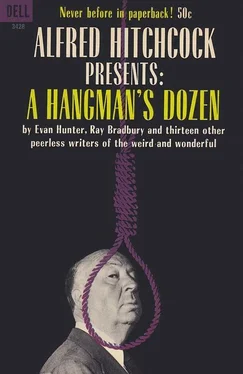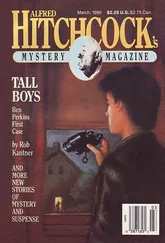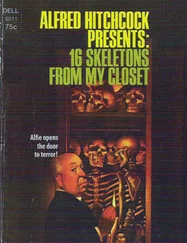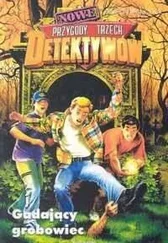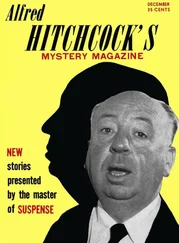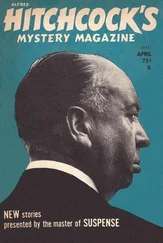“I’m sorry,” I said firmly. “I’m not interested.”
“But you haven’t heard the best part,” he said urgently.
“No,” I said, and I slammed the door, reflecting that Janice would have bought the Encyclopedia Universicana, and that I had dispatched her just in time.
But I had to get on with the plan. I would now ransack the house, emptying bureau drawers onto the floor, hurling clothing around in closets and so forth. Then, when it was time, I would leave for my train.
I turned toward the bedrooms, and the phone rang.
Once again, I froze. To answer, or not to answer? Once again, as with the doorbell, and for much the same reasons, I decided to answer, and to be, again, the family doctor.
I picked up the phone therefore, said hello, and a falsely hearty woman’s voice chirped, “Magill Communications Survey calling. Is your television set on, sir?”
I stood there, with the phone to my ear.
“Sir?”
“No,” I said, and I hung up.
Doggedly, I turned again toward the bedrooms. And this time, I got there. Opening a bureau drawer, I tossed its entire contents on the floor. I didn’t have to worry about fingerprints. My fingerprints were quite naturally all over everything anyway. The police would simply assume that the burglar, being a professional, had known enough to wear gloves.
I was working on the third drawer, having pocketed three pairs of earrings and an old watch, for realism’s sake, when the doorbell rang.
I sighed, plodded wearily to the living room, and opened the door perhaps an inch.
A short stout woman, smiling like an idiot, said “Hel- lo, there! I’m Mrs. Turner from over on Marigold Lane, and I’m selling chances for our new car raffle at the United Protestant Church.”
“I don’t want any raffles,” I said.
“New car raffle,” she said.
“I don’t want any cars,” I said. I closed the door. Then I quickly opened it again. “I have a car,” I said. And I closed the door again.
On the way back to the bedroom, the echo of that conversation returned to me. I hadn’t been very coherent. Could it be that I was more nervous than I thought?
No matter. In little more than an hour, I would leave here and catch my train for New York.
I lit two cigarettes, stubbed one out in annoyance, and went back to work. I finished the bureau and the one drawer in the vanity table, and was about to start with the closet when the phone rang.
I had never before realized just how shrill, just how grating, that telephone bell actually was. And how long each ring was. And what a little space of time there was between rings. Why, it rang three times before I even took a step, and it managed to get in one more jarring ring for good measure as I was on my way down the hall to the living room.
I picked up the phone and a male voice said in my ear, “Hello, Andy?”
“Andy?”
He said it again, “Hello, Andy?”
Something was wrong. Something was terribly wrong. I said, “Who?”
He said, “Andy.”
“Wrong number,” I said and hung up.
The doorbell clanged.
I jumped, knocking the phone off its stand onto the floor. I scooped it up, fumbling, and the doorbell sounded again.
I raced across the room and, forgetting caution, hurled the door open wide.
The man outside the door was gray-haired, portly and quite dignified. He wore a conservative suit and carried a black briefcase. He smiled upon me and said, “Has Mister Wheet been by yet?”
“Who?”
“Mister Wheet,” he said. “Hasn’t he been here?”
“No one by that name here,” I said. “Wrong number.”
“Well, then,” said the portly man, “I suppose I’ll just have to talk to you myself.” And, before I knew what was going on, he had slipped past me and was standing in the living room, looking around with a great show of admiration and saying, “Lovely. A really lovely living room.”
“Now, see here—” I began.
“Sampson,” said the portly man, extending a firm plump hand. “Encyclopedia Universicana. Little woman at home?”
“I’m afraid she’s sick,” I said. “I was just fixing some broth for her. Chicken — broth. Perhaps some other—”
“I see,” said the portly man. He frowned as though thinking things over, and then smiled and said, “Well, sir, you go right ahead. That’ll give me a chance to get the presentation set up.”
And all at once he was sitting on the sofa. I opened my mouth, but he opened the briefcase faster, dove in, and emerged with a double handful of paper. Sheets and sheets of paper, all standard typewriter size, all gaily-colored in red and green and blue, prominently featuring photographs of receding rows of books. SAVE! roared some of the sheets of paper, in black block print. FREE! screamed others, in red. TRIAL OFFER! shrieked still more, in rainbow hues.
Portly Mister Sampson leaned far forward, puffing a bit, and began to arrange his papers in rows upon the rug, just in front of his pointed-toe, highly polished black shoes. “Our program,” he explained to me, smiling, and lowered his head to distribute more sheets of paper over the floor.
I stared at him. Not five feet from where he was sitting, my late wife Janice lay sprawled upon the kitchen floor. In the bedroom, chaos was the order of the day. In just about an hour, I would leave here and catch the train back to the city. I would leave the .32 in a litter basket, knowing full well some enterprising soul would shortly pick it out again and that by the time the police got hold of it, if they ever did, it would have committed any number of crimes past this current one. And then I would fly to Chicago and see Karen. Lovely Karen. Dear, darling Karen.
And this miserable man was trying to sell me encyclopedias!
I opened my mouth. Quite calmly, I said, “Get out.”
He looked up at me, smiling. “Eh?”
“Get out,” I said.
The smile flickered, “But — you haven’t seen—”
“Get out!” I said, this time a bit louder. I pointed at the door, upsetting a table lamp. “Get out! Just... just... just get out!”
The miserable creature began to splutter. “Well, but... see here—”
“GET OUT!!”
I dashed forward and grabbed all his papers, crumpling them this way and that, gathering them in pay arms, and bore them to the front door. In turning the knob, I dropped half of them. The remaining half I hurled outward, and they fluttered to the lawn. I kicked at those remaining, and turned to glare at Mister Sampson as he scuttled from the house, wanting to bluster but a bit too afraid of me to say anything.
I slammed the door after him and took a deep breath, forcing myself to be calm. I lit a cigarette. I lit another cigarette. Irritably, I stubbed the first one in a handy ash tray, and lit a third. “Tcha!” I cried, and mashed them all out, and stormed back to the bedroom, where I tore into the closet with genuine pleasure. Once the closet was a hopeless wreck, I ripped the covers from the bed and dumped the mattress on the floor. Then I surveyed my handiwork.
And the doorbell rang.
“If that is Mister Sampson,” I muttered to myself, “by Heaven I’ll—”
It rang again. We had an incredibly loud doorbell in that house. Odd I’d never noticed it before.
It rang again as I was on my way to answer, and I almost shouted at it to shut up. But I managed to bring myself under control by the time I reached the door, and to remember to open it not more than an inch.
A tiny girl in a green uniform stood looking up at me; she was bearing a box of cookies.
Life, I reflected at that moment, is unkind and cruel. I said, “We already bought some, little girl,” and I softly closed the door.
Читать дальше
